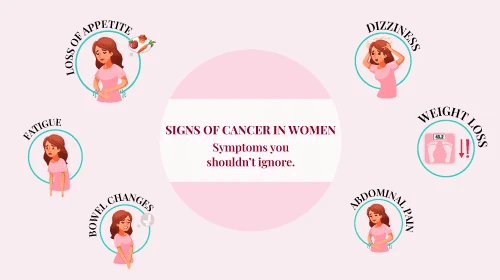Cancer Diagnosis and Early Symptoms in Women
Cancer diagnosis is important, especially in womenTypes of cancer in women are different from those in men. These days, women manage their careers and care for the home and family. This frequently causes people to prioritize the health of their families over their own, ignoring their own health in the process. This is due in part to stigma and a lack of knowledge, particularly when it comes to gynecological issues. However, doing so may result in the loss of a chance for early cancer diagnosis and the prevention of potentially dangerous illnesses.
Improving the results of cancer treatment depends on early cancer diagnosis and detection. Women frequently ignore several cancer signs and symptoms, thinking they are the result of other conditions. Early cancer diagnosis depends on being aware of the warning symptoms. These are some cancer diagnosis indicators that women need to be mindful of and take seriously.
Lumps
While other changes may also suggest breast cancer, lumps or swelling in the breast or axilla may be an important symptom to be used for cancer diagnosis. These consist of dimpling, redness, skin irritation, and any changes or discharge from the nipple.

Any discernible change in the look of the breast should prompt a visit to the physician. Breast cancer may be indicated by the presence of lumps, thickness, or changes in the size or form of the breasts; therefore, any such findings should not be disregarded. Every woman has to perform a monthly breast self-examination, ideally during the latter half of her menstrual cycle.
Bleeding
Any bleeding that doesn’t coincide with the menstrual cycle is a reason for concern. This includes bleeding after sexual activity, following menopause, and in between cycles.

To rule out endometrial or cervical cancer, see a physician. Intermittent menstrual bleeding, bleeding after menopause, and coital (sexual activity) hemorrhage—all of which may be interpreted as typical menstruation—may be indicators of gynecological cancers, including ovarian, cervical, or uterine cancer.
Coughing
The director of oncology at Apollo Cancer Centers, Dr. Anil D’Cruz, states that persistent coughing or hoarseness that lasts more than a few weeks may be a sign of throat or lung cancer. Although first consultations with general practitioners are frequent, depending exclusively on X-rays may result in an incorrect diagnosis, especially when malignant patches are mistaken for tuberculosis. A precise diagnosis and professional evaluation are essential for the right course of treatment.

Thyroid cancer may be the cause of this. In females, thyroid nodules are extremely frequent. Most of them are just goiters, nothing malignant. However, if there is swelling on the lateral side of the neck, away from the midline, or in front of the neck, and if the enlargement of lymph nodes is growing larger over time or if it has been there for longer than four weeks, seeking a specialist’s opinion and ruling out cancer is preferable. A straightforward sonography test that can confirm a cancer diagnosis can be performed with or without a needle test.
Unexpected weight reductions must be addressed.
Though it may be every woman’s ambition to lose weight naturally, it can also be an early indicator of ovarian or breast cancer. You should see a doctor to rule out any underlying causes if you see a noticeable drop in weight without making any dietary or exercise modifications.
Fatigue
Dr. Kunal Oswal, BDS, MPH, MHM, Screening and Early Detection, Karkinos Healthcare, states that feeling exhausted is normal, particularly given our hectic lifestyles in today’s fast-paced world.

On the other hand, a persistent sense of exhaustion that does not subside with rest may indicate a more serious condition. Anemia-inducing blood cancers like leukemia and lymphoma, as well as tumors like breast and prostate cancer that affect hormone levels, can all contribute to fatigue.
Moles

Skin moles are common, but alterations to their color, size, or shape or the emergence of new moles may indicate skin cancer. Routinely examining moles and other skin abnormalities can help in early skin cancer diagnosis.
Bloating
While occasional bloating is normal, persistent bloating that is accompanied by changes in bowel habits, early satiety, or stomach pain should not be ignored, as these symptoms may be indicative of ovarian cancer.
Bloating and fullness that occur periodically could be typical symptoms of indigestion brought on by overindulging in food. However, if the condition persists for a long time, does not improve with dietary changes, or is associated with pain or weight loss, a doctor must examine it.

When it comes to ailments like acidity, constipation, or diarrhea, women may self-medicate with over-the-counter medications and miss out on crucial early diagnosis time.
If you need help with a cancer diagnosis,
While cancer diagnosis requires the use of technological equipment and special skills, we recommend contacting your family healthcare provider, who will perform an initial examination and testing. After that, your family physician will refer you to a specialist if needed. If the test turns out negative and a cancer diagnosis is ruled out, we recommend you consider holistic diagnostics and treatment.
Some holistic tests may be helpful for cancer diagnosis and detecting possible cancer development before the first malignant cells grow in your body. Using a constitutional approach, holistic professionals may predict and prevent cancer.
Contact Philadelphia Holistic Clinic at (267) 403-3085 to schedule your appointment with Dr. Tsan and discuss your medical condition and any necessary tests or treatments.
